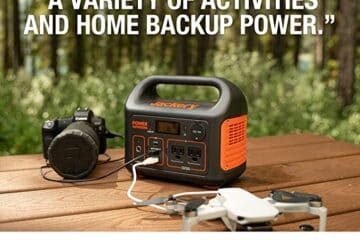Survival books are essential fountains that you can tap into for a variety of useful outdoor knowledge. Some are more heavily focused on tips and tricks for building fire, making shelter, and finding food. Others cover everything you’ll need to know about wilderness medicine.
Luckily, many outdoor enthusiasts and survivalists have come before us and decided to compile their experiences and lessons into books that we can learn from. A great number of these books are fantastic resources to keep with you whenever you venture into the wilderness.
We’ve compiled our list of the 10 Best Survival Books to help you find one that fits your needs. At the conclusion of this ranking, we’ve also put together a comprehensive Buyer’s Guide to simplify the process and ensure that you find a book that contains the information you’re searching for.
1. Bushcraft 101
Bushcraft 101 is A Field Guide to the Art of Wilderness Survival, written by Dave Canterbury. Dave is the co-owner and supervising instructor at the Pathfinder School (1), which was named one of the Top 12 Survival Schools in the United States by USA Today.
This book covers building your survival kit, manufacturing tools and supplies on the go, scavenging food, cooking, and protecting yourself from the elements. Coined “The Ultimate Resources for experiencing the backcountry,” it is based on the 5 Cs of Survivability: cutting tools, covering, combustion devices, containers, and cordages.
2. The SAS Survival Guide
The SAS Survival Guide details How to Survive in the Wild, on Land or Sea, and is written by John ‘Lofty’ Wiseman. Wiseman served 26 years with and was Chief Survival Instructor for the Special Air Service (SAS) (2). He is widely considered the foremost authority on SAS training techniques for civilians.
This book details survival techniques for every climate imaginable, including a newly added section for handing urban dangers. It covers preparation, navigation, food and health, urban safety and security, and disaster survival.
3. Primitive Skills and Crafts
Primitive Skills and Crafts is An Outdoorsman’s Guide to Shelters, Tools, Weapons, Tracking, Survival, and More. Richard and Linda Jamison compiled the information in the book. It contains insights from archaeologists, anthropologists, primitive practitioners, craftsmen, and artisans.
It’s a great read for mastering survival skills or simply being more prepared for family-friendly outdoor adventures. The contributing experts discuss topics including, fire making, camp cooking, basket weaving, pottery making, animal tracking, and much more.
4. The Survival Medicine Handbook
The Survival Medicine Handbook is THE Essential Guide for when Medical Help is NOT on the way. The author is Joseph Alton, M.D., who practiced as a board-certified Obstetrician and Pelvic Surgeon for more than 25 years. When he retired, Alton dedicated himself to the mission of “put[ting] a medical prepared person in every family for any disaster.”
His book is an incredibly detailed, 670-page guide for anyone that wants to stay prepared for medical situations when immediate help isn’t available. It covers principles of medical preparedness, spirituality and survival, modern medicine vs. survival medicine, how to sterilize medical supplies, and much more.
5. Prepper’s Long-Term Survival Guide
Prepper’s Long-Term Survival Guide includes information on Food, Shelter, Security, Off-the-Grid Power, and More Life-Saving Strategies for Self-Sufficient Living. Jim Cobb is the author of this fantastic resource. Jim has worked for nearly 20 years in the security management and investigation fields and is the owner and lead trainer of the Disaster Prep Consultants (3).
This guide isn’t designed just to prepare you for a hurricane, earthquake, or other short-term disasters. Jim gives you the information you need to know about a global pandemic, failure of the power grid, or other long-term crisis. It includes tips for practical water and food collection and storage, first aid and medical treatments, techniques for fortifying and defending your home, and more.
6. 100 Deadly Skills
The Survival Edition of 100 Deadly Skills is The SEAL Operative’s Guide to Surviving in the Wild and Being Prepare for Any Disaster. Clint Emerson is the author of this New York Times Bestseller. Clint served in the Navy for 20 years, including stints with SEAL Team Three and SEAL Team Six. He now runs a crisis management consulting company called Escape the Wolf (4).
This survival guide was inspired by the real-life field experiences of Special Forces operations and adapted for civilians. It covers the basics of securing shelter, building fire, and finding food, but also details tested techniques for surviving a hostage situation, an active shooter, a suicide bomber, or even a terrorist threat on the subway.
7. Build the Perfect Bug Out Bag Survival Skills
Build the Perfect Bug Out Bag Survival Skills is Your Guide to Emergency Wilderness Survival. Creek Stewart is the author of this wilderness survival resource. Creek is the owner and lead instructor at Willow Haven Outdoor (5), and regularly publishes articles on disaster preparedness in numerous magazines.
This guide focuses on the essential skills you’ll need to endure a bug out situation or extended off-grid scenario. It features detailed instructions for survival skills that emphasize the use of primitive tools with step-by-step photos to illustrate complex techniques like knot tying, shelter construction, fire building and setting snares and traps.
8. Deep Survival
Deep Survival is a psychological investigation of Who Lives, Who Dies, and Why. Laurence Gonzales is the author of this riveting resource that intertwines real-life survival stories with science-based analyses of why certain people survive in certain situations, and why!
For more than a decade since its original publication, this book has helped save lives from the deepest wildernesses, as well as lending to the improvement of readers’ everyday lives. It contains advice from business leaders, military officers, educators, and psychiatric professionals on taking control of stress, assessing risk, and improving decision-making under pressure.
9. Hawke’s Green Beret Survival Manual
Hawke’s Green Beret Survival Manual contains Essential Strategies for Shelter and Water, Food and Fire, Tools and Medicine, Navigation and Signaling, Survival Psychology, and Getting Out Alive! Mykel Hawke is the author and is a Green Beret combat veteran, Retired Captain in the U.S. Army Special Forces, and Director of Spec Ops Inc. (6), an international outdoor-survival training company.
His book is a home reference designed to be useful for seasoned outdoorsmen and average citizens alike. It features illustrated instruction and Hawke’s engaging, matter-of-fact writing style, which is buoyed by his incredible resume in the survival arena.
10. Advanced Bushcraft 
Advanced Bushcraft is An Expert Field Guide to the Art of Wilderness Survival. Author Dave Canterbury provides a more in-depth follow-up to Bushcraft 101. It goes beyond the basics to teach readers how to survive in the backcountry with little to no equipment.
This book is designed to teach you how to immerse yourself in the wilderness with advanced bushcraft and woodcraft techniques. It includes more advanced information about tracking, plant medicine, and navigating without the use of a map or compass.
—
Buyer’s Guide
Surviving in the wilderness goes well beyond using the well-known S.T.O.P. acronym (7). While stopping, thinking, observing, and planning is important, there are a variety of skills you’ll need beyond that. This Buyer’s Guide will help you choose the survival book that’s best for your needs.
What is your outdoor experience?
The first major consideration when selecting a survival book is how much wilderness experience you already have. If you’re a seasoned backpacker who wants to learn more about surviving with the bare minimum, a book like Advanced Bushcraft might be appropriate.
On the other hand, if you’re finding a new interest in outdoor adventure and survival, Canterbury’s other selection, Bushcraft 101 may start you out with the basics you need. It’s important, also, to remember that extensive backpacking experience doesn’t necessarily equate to bushcraft experience, and it also might not prepare you to handle an extended off-grid living situation.
Your experience with the outdoors, wilderness, and survival techniques will dictate which survival book you choose. Make sure you’re honest with the information and experience you already have so that you can select a book that adds to that, rather than goes right over your head because it’s too advanced.
What areas do you want to learn about?
The second consideration is what areas you’re most interested in learning about. The books we’ve detailed above cover shelter building, fire starting, food and water collection, wilderness medicine, creating tools, and much more.
You may be a casual backpacker with a recent injury experience that left you feeling like you need to learn more about wilderness medicine. You may be a hurricane-survivor who is considering whether you’d still be prepared if the three days you were without power turned into a week or a month.
Survival, both in the wilderness and sometimes in urban areas, involves a lot of sub-topics. It’s important to understand why you’re looking for a survival book. Narrowing down your specific interests will help you make a better book choice.
What is survival scenario is your biggest concern?
The information in the books we’ve highlighted will prepare you for a wide variety of survival scenarios. Understanding which scenario causes you the most concern will help you decide which book to purchase.
For example, there are many different situations to prepare for if you’re an avid backpacker in the Pacific Northwest. But those situations will be vastly different from what the backcountry fisherman in the Everglades will encounter. Knowing what scenarios are most pertinent to your activities will help you select the book that’ll be your best resource.
Frequently Asked Questions
On average, the National Park Services in the United States responds to 11.2 incidents daily. Each operation costs around $895. We hope that these survival books can bring both of these numbers down, and this section will feature some of the most frequently asked questions about survival.
What is the most critical part of wilderness survival?
Most experts will tell you that the first ten minutes of being lost is when most search fatalities make their deadly mistake. Staying calm and using your head (not your feet) very well may be the most critical aspect of survival.
What is Bushcraft?
The dictionary defines bushcraft as “skill at living in the bush.” In greater depth, bushcraft is the art of using the resources provided by our natural environment to survive and thrive in the great outdoors (8).
What is a bug out bag?
A bug out bag is an emergency evacuation kit that contains everything you’ll need to help your family go from a dangerous area to a safe area without a lack of supplies or equipment. They contain essential survival gear and are used widely by first responders, military personnel, and medical professionals.
What are the 5 keys to wilderness survival?
The five common keys most people talk about are: know how to build a shelter, know how to signal for help, know what to eat and how to find it, know how to build and maintain a fire, and know how to find water and prepare safe water to drink.
What are some common mistakes people make in the wilderness?
Common mistakes that reduce your odds of survival include no shelter, a lack of navigation tools, poor knowledge, miscalculating risk, incorrect clothing, an inability to obtain drinkable water, no signal plan, and the lack of ability to make fire.
What is the best way to orient your position in the wilderness?
While it can be tempting to use a prominent peak or another feature of land marked on a map to orient yourself, many experts suggest using a baseline, such as a road or a river. This is because it’s easier to hit a long target (like a power line or stream) than it is to hit a tall one (think hilltop) or a small one (like a pond).
When you’re heading out on a hunt or hike, note which direction you need to travel to hit your baseline. That way, if you become confused and disoriented later on you can take a bearing and walk a straight line in that direction until you find your baseline.
What is your first step when you realize you’re lost?
Your first step immediately after you realize you’re lost is to mark your position and find your way back to the last familiar place. Survival experts refer to this as the “home base” method of navigation.
What is the warmest place to camp once the sun goes down?
Generally, the warmest place to make camp if you’re lost and the sun is going down shortly is a forested north slope. South-facing slopes, whether they’re wooded or open, are more subject to extreme temperature shifts. North-facing slopes, although they may be colder during the day, will say warmer during the nights.
Summary
Did you know that you should tell at least three people where you’re going when leaving for an adventure? (9) This is just one example of what you might learn by picking up one of the survival books we’ve outlined in this article. We hope the information we’ve provided is useful when it comes to finding the survival book that’s right for you!












